Remember when Matthew McConaughey was only famous for his abs and terrible romantic comedies?
I don’t know if he suddenly took an acting class and realized his full potential, but his role as homophobic rodeo-aficionado-turned-AIDS activist Ron Woodruff in “Dallas Buyers Club” is not even close to the McConaughey we thought we knew. Rather, we get an actor whose performance almost single-handedly carries what might otherwise have been a pretty lackluster biopic.
The new film from director Jean-Marc Vallée follows the mostly-true story of Woodruff, an electrician living in Texas in the late ‘80s with a taste for hard drugs, alcohol and misogyny. Woodruff’s lifestyle—particularly the bigoted and violent view of homosexuality he shares with his group of blue-collar friends—is overhauled when he is diagnosed with HIV.
From there, the film follows Woodruff’s journey as he tries to find treatment, coming up against money-hungry pharmaceutical companies and the FDA as he attempts to smuggle unapproved drugs over the border. Woodruff eventually connects with Rayon (Jared Leto), a transgender woman also suffering from HIV, and the two begin selling the drugs to other patients who can’t afford the expensive and possibly toxic alternative AZT.
This film rests on the quality of its actors, and luckily, McConaughey gives what is easily the best performance of his career. He reportedly dropped between 30 and 50 pounds for the role, and the transformation is something to behold. The character wouldn’t have been nearly as developed if this change was purely aesthetic, but McConaughey has the acting to back up the transformation of his body. Woodruff is gaunt and despicable, a machismo-pumping opportunist made semi-moral by his illness.
Leto’s performance also warrants praise; he similarly lost a lot of weight for the role and plays Rayon with equal parts energy and nuance. Leto never drops character or turns the role into a parody, and the moments between Rayon and Woodruff are the film’s best—never dipping too far into melodrama, and never forcing easy resolutions when Woodruff’s narrow-mindedness gets in the way.
By foregoing overdone techniques, Vallée keeps the movie from feeling too emotionally manipulative. With actors like these, the performances are enough to transmit most of the work’s moral poignancy. The audience isn’t allowed to forget that both characters’ struggles are part of a countrywide epidemic, and their frustrations with the American medical system’s sluggishness are present without being preachy.
All of this being said, some of the film’s thematic elements feel less than authentic. Despite his changing views, Woodruff’s gruff, aggressively heterosexual persona is constantly asserted throughout the film, making his transition to open-mindedness feel less genuine. Rayon’s character becomes less a partner and more a dependent as the story unfolds, and the hackneyed romance between Woodruff and Dr. Eve Saks (Jennifer Garner) feels entirely forced. It’s these aspects of the film that remind us that, despite the apparent changes in Woodruff’s outlook, we’re still expected to treat him as our heteronormative guide through the film.
Past these problems, though, the film’s acting makes it more than a worthy venture—if anything, just to see that an actor like McConaughey still has a few tricks up his sleeve.













